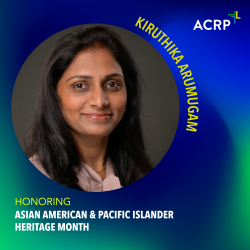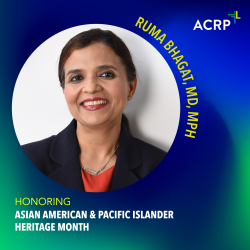On Day Two of ACRP 2024 in Anaheim, Calif., attendees were invited to take advantage of “the power of pause” to calm down their overstressed and nonstop brains, while on Day Three, they were encouraged to think of each day as Day One for making the kinds of incremental changes that will lead to clinical research being recognized widely as profession and clinical trials as a clinical care option.
Sharing life lessons in a Signature Series talk on Saturday (May 4) about the importance of transforming mental health and wellness in the workplace from her experiences as both a physician and former patient, Romie Mushtaq, MD, Chief Wellness Officer for Great Wolf Resorts, said, “I do this because I come here from a place where I [once] felt hope depart my soul [as if it was saying] ‘exit stage left.’ …There were days [more than a decade ago] when I felt like, ‘does someone have the ON/OFF switch to my brain?’”
Besides her complicated duties as a doctor in neurology at the time, she came to realize that esophageal precancerous lesions were wearing on her body, leading to even greater stressful thoughts about how the health crisis would affect her career and what others would think of her, and eventually to burnout. “I wish someone had told me when I was in the hospital…[that] ‘your brain is not broken, your mind is not a mess, [and] your spirit did not depart your soul,’” she said.
Recovering from surgery led her down a path involving a combination of neurology research, integrative medicine, and mindfulness and meditation practices for the creation of the brainSHIFT Institute, with a mission of helping clients build a culture of care for better leadership, reduced healthcare costs, and stronger team building and engagement within organizations. “If we can’t get our brains straight, we can’t build our dreams or our teams,” she said.
Anyone can assess their own need for breaking out of the modern “stimulant-sedative cycle” by taking what Mushtaq calls the Busy Brain Test at drromie.com/busybraintest.
Also sharing advice on breaking free of unproductive habits on Saturday was Suzanne Kincaid, CCRA, ACRP-PM, FACRP, Consultant and Owner of Responsibility Research, in her session on “The Intersection of Technology and People: Harnessing Technology to Increase Efficiency and Build Relationships.”
Noting that the average clinical researcher may be using nearly 40 different technologies in terms of products and services each day, Kincaid advocated for best time management practices in taming the daily deluge of emails and proliferating passwords, crafting clear content in one’s own communications, and choosing the most efficient format for reaching out to others with requests for information.
Among her sage observations on the power of personal contacts in the clinical research profession, Kincaid reminded her audience that “Networking is not just shaking hands with someone in a big, empty room—it is [actually] communicating with others” and “If we only [actually call someone to] talk when there’s a problem, that’s a problem.”
Delivering his 13th presentation at an ACRP gathering over the years on Sunday (May 5), David Burrow, PharmD, JD, Director of the Office of Scientific Investigations, Office of Compliance, for the Center for Drug Evaluation and Research (CDER) at the U.S. Food and Drug Administration, also took up the theme of keeping a clear head and maintaining a positive attitude in the day-to-day business of clinical research. “We are not in the business of perfection,” he reminded his audience. “We are in the business of minimizing the chance that errors that really matter will occur.”
Pointing out in his Signature Series talk how an evolving clinical trials ecosystem of study design, execution, and assessment is changing the way research professionals think of their role in “this three-ring circus,” Burrow added, “The only real constant in clinical research is the clinical research workforce…[and] we have the opportunity here to reimagine our roles…and how we drive innovation at a macro level.”
Touching on the tenets of Quality by Design practices, Burrow encouraged attendees to take advantage of the publicly available resources on the topic from the Clinical Trials Transformation Initiative and to take “a great leap into the unknown” by engaging all stakeholders in study development—including sponsors, contract research organizations, and vendors; sites, both as organizations and in terms of the individual roles based within them; and patients and other research participants. A more tactical approach to study design “clears the road” to better operationalization of the research, he added.
Burrow also highlighted the new CDER Center for Clinical Trial Innovation (C3TI) as a central hub that supports innovative approaches to clinical trials that are designed to improve the efficiency of drug development. He further noted how everyone in the audience could shift perspectives on the role of clinical research professionals by advancing “the role of clinical study staff in planning and deploying trials in a dynamic and fluid environment in real time in a way that generates quality data.”
“One day, we are going to have the clinical research workforce recognized as a profession [and clinical trials as part of] clinical care” by everyone, Burrow said. “What if this is Day One of clinical research professionals [making the small changes day after day that will lead to you] being recognized as the incredible assets you are? And clinical research being recognized as care? How empowering might that be?”
Author: Gary Cramer



